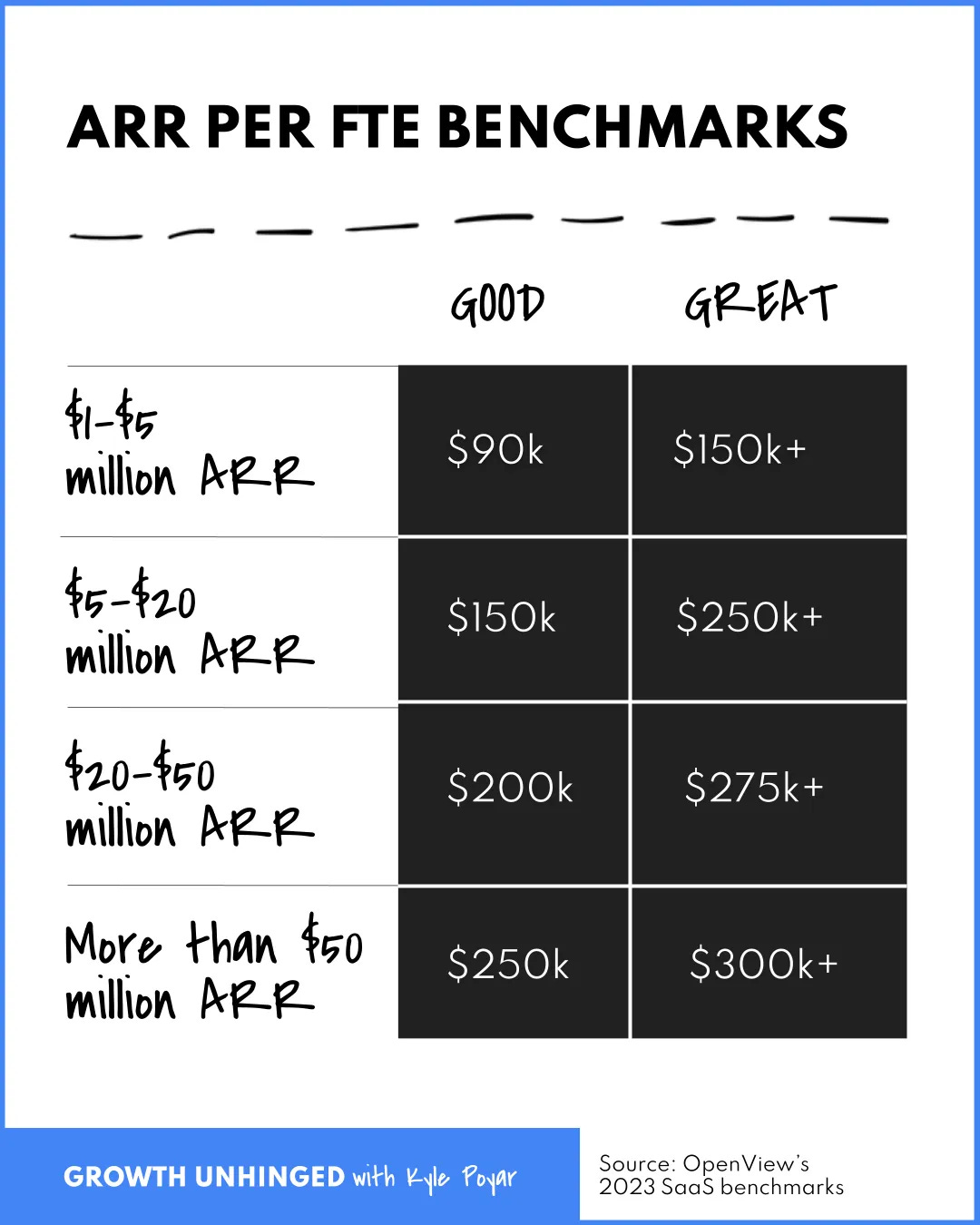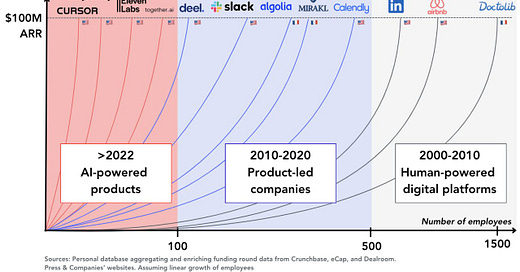$100M ARR with <100 Employees: AI startups are defining new standards
Will the AI era belong to small teams?
Hey, Pierre-Jean here 👋 Welcome to this new edition of The Growth Mind!
Today, I’m sharing insights and data on how AI-native companies are scaling faster than ever, redefining what great growth looks like.
⏱️ Reading time → 5 minutes
For more: Best of The Growth Mind | Work with me
AI native companies are growing fast, with teams leaner than ever before
I’ve recently come across this great chart made by Newfund Capital, an early-stage VC based in Silicon Valley and Paris, showing how AI native companies manage to grow with much smaller teams.
While $100M ARR used to take 500+ employees in the early 2000s’, some AI startups are now reaching this point with <100, reshaping the way we envision what is good growth.
Looking back at the past 20+ years, we can separate the type of companies reaching $100M ARR fast in 3 categories:
1️⃣ 𝟮𝟬𝟬𝟬-𝟮𝟬𝟭𝟬 → 𝗧𝗵𝗲 𝗵𝘂𝗺𝗮𝗻-𝗽𝗼𝘄𝗲𝗿𝗲𝗱 𝗱𝗶𝗴𝗶𝘁𝗮𝗹 𝗽𝗹𝗮𝘁𝗳𝗼𝗿𝗺𝘀
ARR per employee → $70k - $200k
This was the era of marketplaces and consumer platforms.
An era where a lot of existing services needed to be digitalized (eg. Airbnb for booking a night in someone’s house, Doctolib to get a medical appointment). Those companies needed 500 to 1,500+ employees to reach $100M ARR.
2️⃣ 𝟮𝟬𝟭𝟬-𝟮𝟬𝟮𝟬 → 𝗧𝗵𝗲 𝗽𝗿𝗼𝗱𝘂𝗰𝘁-𝗹𝗲𝗱 𝗴𝗿𝗼𝘄𝘁𝗵 𝗲𝗿𝗮
ARR per employee → $200k - $350k
Entered the era of product-led growth, where B2B SaaS startups were revolutionizing the way we buy software, by adopting an approach where the product is the main growth driver, and not the sales team anymore.
They “consumerized” the way B2B SaaS grew, leading to a better ARR per employee. Slack, Loom or Calendly are perfect examples of it.
Those companies needed 300-500 employees to reach $100M ARR.
3️⃣ >𝟮𝟬𝟮𝟮 → 𝗔𝗜-𝗽𝗼𝘄𝗲𝗿𝗲𝗱 𝗽𝗿𝗼𝗱𝘂𝗰𝘁𝘀
ARR per employee range → $1M - $2M
We’re now in the AI era, where companies of less than 100 employees are reaching $100M ARR.
Those startups manage to grow fast with small teams, thanks to products that scale and operations that are more automated than ever before.
Some of the most famous ones are Cursor and Midjourney, but Open AI is also in similar standards.
ARR per full-time employee (FTE) is then reaching higher standards
ARR (annual recurring revenue) per employee was already a super important metric for SaaS businesses. The more revenue per employee you make, the more chances to be profitable. But standards are likely to be redefined if we look at AI native startups’ trajectory.
Early 2024, Kyle Poyar, the author of
, shared the following benchmark of what is a good and great ARR per FTE:
What’s interesting to see is how things changed in a few months. The best performing AI companies, with an ARR per employee > 1M$, are outperforming by far (>3x) what was considered as “great”. Of course, they are outliers yet, but they’re shaping a new trend.
Even at a smaller stage, some AI companies are already crushing it. Take Lovable example: they reached 17M$ ARR with a team of 15 employees, only 3 months after their launch 👇
Another great example, but this time at a much larger scale, is Open AI. It’s quite hard to have very precise date data about their revenue and number of employees, but we estimate that in late 2024:
Open AI Revenue was ~$4 billion (source: https://sacra.com/c/openai/)
~3,500-4,000 employees worked at Open AI at this time
So the ARR per FTE is estimated → 1M - 1.2M per employee
Take this data with caution, as it’s only an estimation. But it gives us an order of magnitude.
Are we going to see the end of large teams? How will it shape the tech economy in the future?
“In my little group chat with my tech CEO friends there’s this betting pool for the first year that there is a one-person billion-dollar company”
Sam Altman
A year ago, Sam Altman predicted that AI would soon enable a single founder to build a unicorn without having to hire employees.
We’re not there yet, but there is a trend going in that direction. I’m not sure about its impact in 10+ years, but here are a few key factors I wanted to go through:
1/ Small teams can achieve more than ever before. But the hypergrowth of some amazing companies might also be misleading.
Thanks to AI, you can now automate or at least reduce the time spent on many individual tasks. Meaning you can do more with fewer people. We’re still in the early stages of the AI curve, so I believe that companies that are crushing it yet are surfing on a strong wave. Everyone wants to use AI for everything, so the demand is huge, while the offer of great products is still relatively low. With more competitors popping up in the future, things might tend to come back to “normal”.
2/ AI is reshaping the software/app industry as Shopify/CMS did with E-commerce. Competition will become more intense.
With fewer barriers to create softwares/apps, we’ll likely see thousands of similar products popping up. Distribution, coupled with a good product sense, will then become even more important. We saw this in the last 5-10 years, when dropshipping became a strong trend, helped by the rise of Shopify and other CMS that reduced the complexity of building an online store.
90%+ products will probably fail, but it’s an opportunity to create, especially for non-tech people.
3/ With ‘low quality’ tasks (partially) automated by AI, having good taste and being capable of taking the right decisions will be your superpowers.
We already seeing AI used strongly for:
handling basic support tickets
writing/reviewing code
assisting in content creation/ideation
That means some of the tasks needing a human will be soon (or already are) partially or fully automated. Nothing to fear in my opinion, as it’s how the world always evolved since the Industrial Revolution. But the purely “soft” skills, like understanding user needs or having a good taste when building a product or a campaign, are what differentiate you. As it has always been, being adaptable and a continuous learner are strong strengths.
In short, exciting times ahead 👀
Want to work together? Here are 2 ways I can help you:
Fractional growth lead: I act as your part-time growth lead to design and execute scalable full-funnel strategies. Perfect for startups needing senior-level expertise without committing to a full-time hire.
Growth strategy audit: An audit of your current growth strategy and a co-creation of your growth roadmap, within a few days. You end up with a clear list of priorities and experiments to execute.
→ Available in French 🇫🇷 and English 🇬🇧





